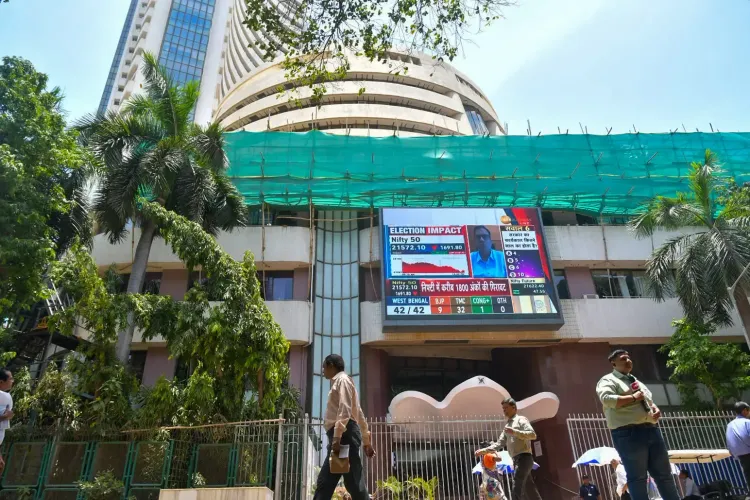Weekly Market Update: Indian Stocks Experience Range-Bound Trading Amid Global Uncertainty

Synopsis
Key Takeaways
- Nifty fell by 147.50 points to 22,397.20.
- Sensex dropped 511.18 points to 73,828.91.
- Midcaps and smallcaps saw significant selling pressure.
- Global market sentiment remains uncertain amidst tariff concerns.
- A breakout from the 22,250-22,650 range is anticipated.
Mumbai, March 14 (NationPress) The Indian stock markets exhibited a range-bound trend, concluding the week with slight declines due to mixed global cues.
Due to the Holi holiday on March 14, trading occurred for only four days (from March 10 to 13).
During the past week, the Nifty index dropped by 147.50 points, or 0.65 percent, settling at 22,397.20, while the Sensex decreased by 511.18 points, or 0.69 percent, to close at 73,828.91.
Midcap and small-cap stocks experienced significant selling pressure compared to large-cap stocks. The Nifty Midcap 100 index fell 1,223 points, or 2.48 percent, to 48,125.10, and the Nifty Smallcap 100 index dropped 503 points, or 3.27 percent, to 14,897.35.
Investor sentiment in the global markets remained uncertain, primarily due to concerns surrounding US President Donald Trump’s tariff policies.
This uncertainty prompted investors to take a cautious stance, leading to a lacklustre trading session.
According to Ajit Mishra, SVP of Research at Religare Broking Ltd, "On the weekly expiry day, the markets remained range-bound and closed slightly lower. Positive global cues initially caused a brief uptick, but selling pressure in heavyweight stocks across various sectors pulled the Nifty into negative territory, ultimately settling at 22,397.20."
Other than the banking sector, all major indices finished lower, with realty, auto, and metal stocks leading the declines. The broader indices mirrored this trend, each losing nearly one percent.
"The ongoing consolidation within the Nifty index has kept participants on edge, but a decisive breakout from the 22,250-22,650 range is anticipated soon," he added.
On Thursday, the Indian stock markets concluded on a weak note.
The Sensex had a promising start, achieving a high of 74,401 in early trading. However, selling pressure in auto, IT, and banking stocks caused the index to reverse its gains.
The index reached an intraday low of 73,771 before finishing 201 points lower at 73,829. Over the week, the Sensex experienced a loss of 504 points.
The Nifty also displayed a similar trend. It rose to 22,558 but later fell to 22,377 before closing at 22,397, down 73 points. The index concluded the holiday-shortened week with a loss of 156 points.
Among the major stocks, Tata Motors and IndusInd Bank were the worst performers, each losing nearly 2 percent.









